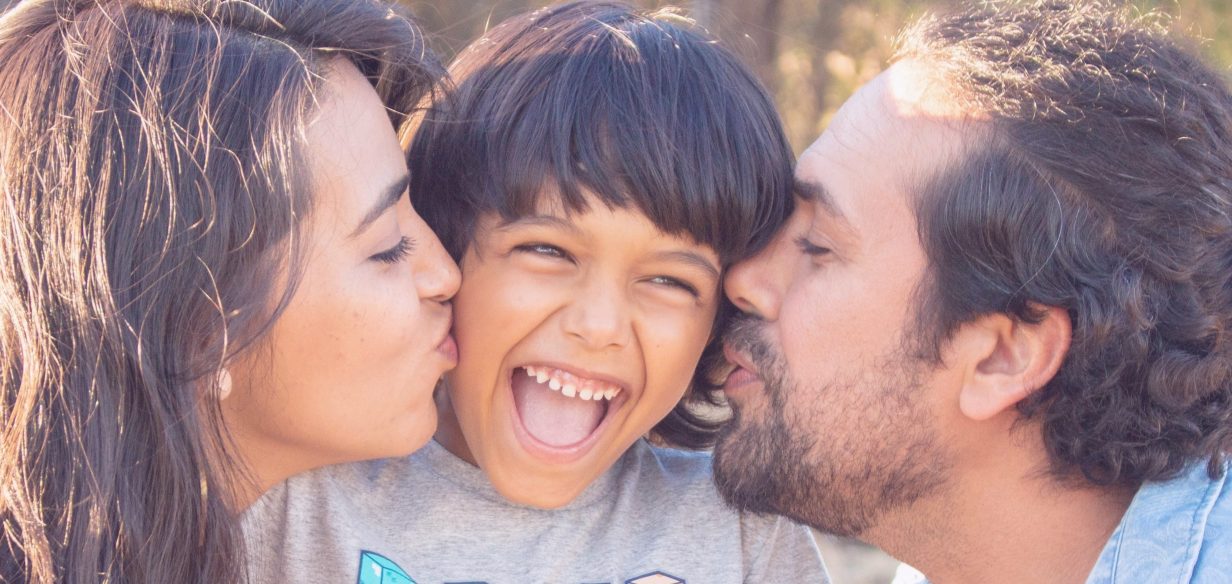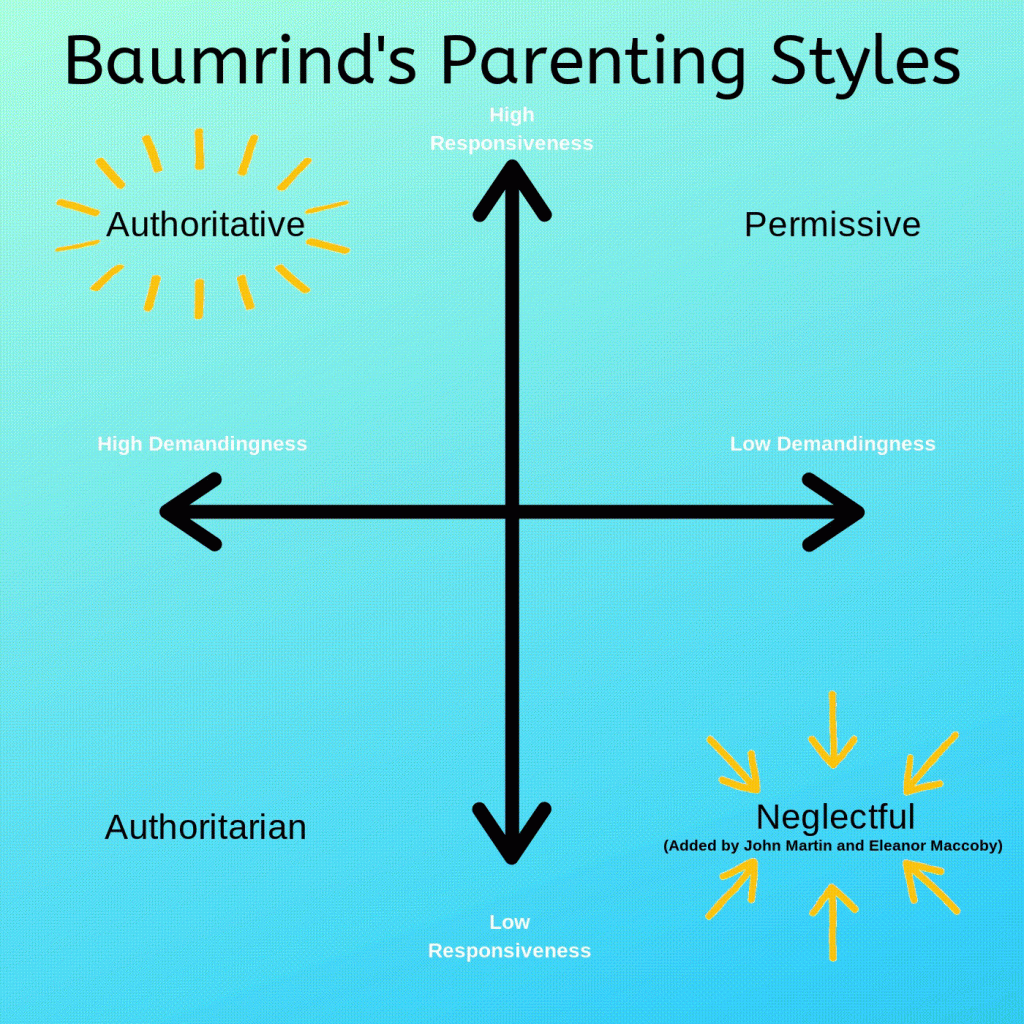What Are the 4 Types of Parenting Styles and Which One is Right for You?

No one approach to parenting suits everyone. That’s why there’s a huge range of different parenting styles that we adopt when bringing up our children.
We have described the parenting strategies of renowned child psychologists such as Diana Baumrind and John Bowlby, reviewed research on child behavior published by the National Library of Medicine and Virginia Commonwealth University, and provided our own examples to help parents identify the four types of parenting styles and find out which one will work best for them, as well as how to improve their current parenting style to be more effective regardless of the type.
Contents:
- What Is A Parenting Style?
- 4 Types of Baumrind’s Parenting Styles
- Attachment Theory
- Other Parenting Styles
- What is the Best Parenting Style?
- How to Make Every Parenting Style Even More Effective?
What Is A Parenting Style?

Prostock-studio/Shutterstock.com
A parenting style is a way of bringing up your child with a specific approach. The parenting style you adopt may differ based on your personality and preferences, or maybe it could depend on your child.
There are four types of parenting styles, most of which have been outlined by legendary psychologist Diana Baumrind.
The three types outlined by Baumrind include the ‘Authoritarian’ style, the ‘Authoritative’ style, and the ‘Permissive’ style.
After further research was carried out on this topic, a fourth style was added to this list by psychologists John Martin and Eleanor Maccoby. This style was known as ‘Uninvolved’ or ‘Neglectful’ parenting.
Research has shown that these four parenting styles may have a huge effect on a child’s educational success and career path.
a study conducted at Shiraz University of Medical Sciences found a negative correlation between the authoritarian parenting style and a child’s educational success. Results also showed us that there was a significant positive correlation between a ‘Firm’ style and the child’s career path.
4 Types of Baumrind’s Parenting Styles

Types of parenting styles
The styles of parenting that Baumrind outlined vary depending on the 2 main factors—’Responsiveness’» and ‘Demandingness’.
The difference in styles was decided based on whether a parent was a highly responsive or low-responsive parent, and whether they were a highly demanding or low-demanding parent.
Understanding your personal parenting style is the first step to becoming an effective parent. There are several recognized types of parenting styles that have been studied extensively in the field of child development. These distinct parenting styles can significantly shape a child’s upbringing and future outlook.
Authoritative
Described in 3 words: Supportive, Firm, Fair.
The authoritative parenting style is coined by its high responsiveness and high demandingness.
This style of parenting involves the parent offering an abundance of support to their child. This involves the parents helping their child to progress and become the best version of themselves, guiding them to become successful.
The authoritative style also implements high standards for behavior and attitude—this style demands the child to respect their parents. There are set rules involved that your child should follow, however, the rules are always fully explained so your child can acknowledge the meaning behind them.
When following this style of parenting, you’re ensuring that you’re consistently building a positive parent-child relationship.
Out of the 3 parenting styles founded by Baumrind, this was her favorite. The authoritative style brings together strict rules, emotional support, and guidance to help your child grow into the best version of themselves.
about 46% of American parents use an authoritative parenting style. An example of authoritative parenting is when parents calmly explain why it’s essential to clean the room and check how their children feel about it. In addition, they might offer incentives or rewards for completing the task.
Authoritarian

Prostock-studio/Shutterstock.com
Described in 3 words: Strict, Disengaged, Demanding.
The authoritarian style of parenting differs from the authoritative approach.
This parenting style is based on a clear set of strict rules—which are often enforced with consequential punishments if they’re not obeyed.
The authoritarian parenting style, marked by strict rules and high expectations, aims to instill discipline. Whilst parents who adopt this approach demand a lot from their child, they’re also very low in terms of responsiveness—they can often be disengaged from their child’s life, offering little to no guidance or support, unlike the authoritative style.
An authoritarian parent also disregards their child’s feelings or opinions on any given topic—another sign of little to no emotional support for their child, which can harm their self-esteem.
Example: A parent might take away the child’s phone or restrict their access to TV or video games for mild infractions like getting a B on a test instead of an A.
Permissive

Prostock-studio/Shutterstock.com
Described in 3 words: Laidback, Forgiving, Tolerant.
As a permissive parent, you may outline rules, but you fail to enforce them.
Your attitude toward parenting is very laid back—you feel that your kids will ultimately find their path in life and learn from their own mistakes.
However, this doesn’t mean permissive parents tend not to support their children. If there’s ever a serious issue, the parent will always step in to offer guidance and support.
This parenting style is more friend-like than parent-like. Although you’ll listen to your child’s issues, wants, and needs, you prefer to take a backstep and allow them to figure things out for themselves.
While permissive parenting may foster independence, it can sometimes lead to challenges in setting limits. If a child misbehaves or disobeys the rules set by their permissive parents, they will likely have little to no consequence which could reinforce bad behavior.
That said, there are some positive aspects associated with permissive parenting. It can lead to children having higher self-esteem, lower rates of depression, and better social skills.
Example: A permissive parent might allow their child to set their bedtime or choose what they want to eat for dinner.
Neglectful

Prostock-studio/Shutterstock.com
Described in 3 words: Disengaged, Distant, Uninvolved.
This style of parenting was discovered by psychologists John Martin and Eleanor Maccoby.
Neglectful parenting is the most undesirable style of parenting to choose from. Neglectful parents often leave their kids to their own devices, whilst offering no support or guidance that would otherwise help them to grow into the best version of themselves.
There are no clear set rules for the child to follow, meaning they’re likely to misbehave more frequently.
This parenting style isn’t always intentional—the parent could be struggling with many other issues which inadvertently means the child becomes a secondary priority.
The child’s wants, needs, opinions, and emotions will often go completely unnoticed, leaving them feeling unwanted and unfulfilled.
Example: An example of a neglectful parent would be someone who is often absent, fails to provide basic needs such as food, clothing, and shelter, or has no interest in their child’s academic performance or social life.
|
4 Types of Parents |
Control |
||
| Low | High | ||
|
Warmth and Support |
Low | Neglectful / Uninvolved Parents
‘Whatever, I don’t care!’ |
Authoritarian Parents
‘Because I say so!’ |
| High | Indulgent / Permissive Parents
‘Sure, honey, whatever you say!’ |
Authoritative Parents
‘Let’s figure it out together’ |
|
Some parents lean towards being permissive parents, allowing their children a great deal of freedom and autonomy. In contrast, the authoritative parenting style emphasizes a balanced approach, combining warmth and clear boundaries. While permissive parenting may foster independence, it can sometimes lead to challenges in setting limits.
It’s essential to explore the characteristics and effects of these different parenting styles to find the best fit for your family. The authoritarian parenting style, marked by strict rules and high expectations, aims to instill discipline. In contrast, the authoritative parenting style encourages open dialogue and mutual respect between parents and children.
How Does Each Style Affect Children?
Each of the perceived parenting styles can affect children in different ways:
- Authoritative parenting can have a profoundly positive effect on children. Children who were brought up with this style of parenting feel nurtured, loved, and guided in the right direction. They will often become more successful in terms of educational achievements and careers.
- Authoritarian parenting can have a somewhat negative impact on children. Children are more likely to become resentful towards their parents, as they’re constantly being punished instead of guided to make better decisions. Children with authoritarian parents may feel unloved and unheard as the parents usually spend little time bonding with their children.
- Permissive parents can make their kids feel like they have no proper guidance or support. Children of permissive parents may struggle in terms of education and careers as a direct consequence of no real parental support. Bad habits may be formed relating to eating habits and hygiene, meaning the child is at higher risk of becoming unwell.
- Neglectful parenting can leave children feeling completely unguided, unheard, and unloved. The long-term effect of this parenting style can be devastating. Children with neglectful parents may have huge confidence issues, become unhappy or even depressed, and may perform poorly in terms of their education and career.
These distinct parenting styles can significantly shape a child’s upbringing and future outlook. It’s essential to explore the characteristics and effects of these different parenting styles to find the best fit for your family.
Attachment Theory

Prostock-studio/Shutterstock.com
The Attachment Theory was first established by UK-based psychologist, John Bowlby. Bowlby carried out an extensive range of studies in the ‘50s and ‘80s.
Bowlby’s stated how children feel scared and alone when separated from their primary caregivers—their parents. As babies are vulnerable and can’t defend themselves, they tend to cry for help when they’re separated from their parents—an instinctive behavior.
In simple terms, Bowlby’s theory suggests that in a child’s early years (0–3 years), the level of attachment a child develops with their parents directly affects their future relationships—both with their parents and everyone else. Attachment parenting is a crucial part of child development and if done incorrectly, can lead to mental health issues, self-esteem issues, and many other issues later on.
Attachment Theory In Adolescence
The Attachment theory—although it is mainly related to a child’s early years—states that the solidity of a child-to-parent bond can have a significant impact on how a child acts during their teenage years.
Research has shown a significant correlation between the strength of the attachment a child has to their parents and how the child grows through adolescence.
Children with stronger attachments with their parents were less likely to partake in behaviors such as underage drinking, drug use, and sexual activity.
Teenage girls who have stronger bonds with their parents directly correlate with lower teenage pregnancy rates, fewer body-image issues, and lower rates of eating disorders.
Teenagers who were securely attached to their parents were also less likely to develop mental health issues, such as depression and anxiety.
Other Parenting Styles

Prostock-studio/Shutterstock.com
As well as the major four parenting styles that we’ve already outlined previously, there are many other styles that parents can employ when bringing up their children.
Other styles include ‘Unconditional Parenting’, ‘Holistic Parenting’, and ‘Nurturant Parenting’:
- Unconditional parenting is characterized by its approach to accepting the child’s actions and behaviors no matter what—allowing them to be themselves. This reinforces the child’s individuality and enables them to grow up feeling accepted for who they are, no matter how they act.
- Holistic parenting is where parents encourage their children to explore their individual beliefs. This involves not enforcing any religious views on your child. Also, instead of setting strict rules, you should instead lead by example.
- Nurturant parenting (also known as ‘Slow Parenting’) is characterized by its steady approach. Instead of rushing to form relationships and setting rules, this style of parenting requires parents to take more time to form meaningful connections with their children. The nurturant parenting style reinforces the fact that life is a journey, where children can constantly learn and progress.
When deciding on the parenting style you wish to adopt, it’s wise to consider the impact it will have on your children in later life. Although it’s important to choose a style that suits you, you must ensure that your child can form secure attachments to you, which will ultimately set them up for a positive and prosperous future.
What is the Best Parenting Style?

Prostock-studio/Shutterstock.com
The most effective parenting style, as stated by developmental psychologist Diana Baumrind herself, is the Authoritative style.
Of all the different parenting styles, authoritative parenting has proven to have the most positive effect on children. It accounts for 93% of children with positive behavior, according to the National Institutes of Health.
The combination of guidance, support, and rules which are enforced, are all strong elements that enable a child to grow into the greatest version of themselves.
Children who have been brought up by authoritative parents are more likely to achieve academic success, as well as success in their careers.
With authoritative parenting, the child feels nurtured and loved, which will help with their confidence and self-esteem as they grow and develop. Also, authoritative parenting emphasizes a balanced approach, combining warmth and clear boundaries.
How to Make Every Parenting Style Even More Effective?

Parenting comes with its own set of challenges, and each parent has their unique parenting style. As a parent, it is essential to find a balance that suits your family’s needs and effectively nurtures your child’s growth and development.
Although each parenting style is unique, there are ways to make every parenting style more effective.
- Understanding Your Child. Every child is unique, and having a solid understanding of their personality can aid you in knowing how to communicate with them, how to best set limits, and how they should be rewarded. Also, take time to understand yourself. One parenting style might not jive well with your personality, but one other (or a blend of others) might be the perfect match.
- Communicate. A positive and open conversation can help even the firmest or most gentle parenting style, connect and understand their child better.
- Consistency. Regardless of your parenting style and parenting practices, consistent discipline, and expectations are necessary. Be consistent in setting limits and consequences for your children’s actions.
- Lead by Example. Children often mimic what they observe in their parents, so it is important to embody the qualities that you would like your child to have.
- Be Flexible. Listen to your children’s opinions and, rather than being strict authoritarian parents, consider using positive discipline strategies to quell child behavior problems instead.
- Rely on Tools. While the tips above will help you become a more effective parent, sometimes, it just makes sense to lean on technology a bit. The Findmykids app can help you become a more effective parent in all kinds of different ways.
The Findmykids app can be seamlessly integrated into any parenting style, whether you’re an authoritarian parent or a bit more laid back. With features like GPS tracking and geofencing, you’ll always know where your child is and be able to set boundaries as needed.
Plus, the app allows for seamless communication between parents and children, ensuring that everyone stays connected and informed. By using the Findmykids app, you can have peace of mind and be a better parent, no matter how you choose to raise your child.
Parenting Styles: The Bottom Line

As you can see, there is a huge range of different parenting styles—all of which have their pros and cons.
Parenting styles are something you may want to seriously consider researching further to ensure your child is brought up in the best way possible.
It’s worth noting how each style can impact your child, especially in terms of how they bond with you in their early years. The attachments your child forms during this period can have a significant effect on their mental health in adolescence and later life.
Not all styles will suit your preferences. You may wish to be more lenient or set more rules. Choosing a style can be difficult, and there’s no such thing as a «one size fits all» approach.
You may choose to use elements from all different styles of parenting, depending on the age of your child or the situations you’re faced with.
If you want to learn more about different parenting styles, including Helicopter Parenting, then check out this awesome blog we’ve just posted for you.

FAQ
What is the most common parenting style?
The most common parenting style is authoritative. This parenting style is characterized by high responsiveness and high expectations. Authoritative parents are attentive, supportive, and set clear boundaries for their children—they give their children the freedom to make their own decisions but are invested in supporting healthy growth as well.
Can you mix parenting styles?
Yes, it is possible and even common for parents to mix different parenting styles, but it is important to understand that mixing parenting styles can be confusing for the child and can make it difficult for them to understand what is expected of them. It is recommended that parents prioritize their child’s needs and use a consistent approach when it comes to discipline and decision-making.
How can I determine my parenting style?
Ask yourself the following questions: do you set clear and consistent boundaries? Are you attentive and supportive of your child’s needs? How do you discipline your child? Once you have answers to these questions, you might be able to identify a particular parenting style that suits you.
What are some common mistakes parents make when it comes to parenting styles?
One common mistake that parents make is being too permissive, which can make it difficult for children to understand boundaries and limits. On the other hand, being too authoritarian can make children fearful and rebellious. Another mistake that parents make is not recognizing their child’s individual needs and temperament, so parents should be responsive to their child’s unique needs and adapt their parenting style accordingly.
References:
- The Power of Positive Parenting | Patient and Family Education | UC Davis Children Hospital: https://health.ucdavis.edu/children/patient-education/Positive-Parenting
- Parenting Styles – Culture and Psychology: https://open.maricopa.edu/culturepsychology/chapter/parenting-styles/
- How understanding your child’s unique nature can make you a more effective parent – VCU News – Virginia Commonwealth University: https://news.vcu.edu/article/2021/09/how-understanding-your-childs-unique-nature-can-make-you-a-more-effective-parent
- Understanding and Improving Your Parenting Style – Y Magazine: https://magazine.byu.edu/article/understanding-improving-parenting-style/
Проверьте электронный ящик



















